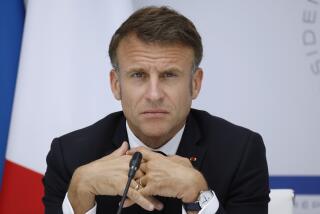Germany’s hand will be uppermost as Europe writes new fiscal rules
Reporting from London — European leaders are coming to grips with the fact that in forging a stronger union capable of weathering the continent’s debt problems, they are also likely to create a more German Europe.
Germany and France, the continent’s two heavyweights — in that order — each made a proposal in the last two days to tighten the bonds of the Eurozone by putting member nations’ spending and budgets under stricter central control. Aligning fiscal and economic policies, they say, is the only way for the zone’s shared euro currency to survive this crisis and avoid new ones.
Leaders of the two countries will meet Monday to work out details of their strategy.
But after years when national leaders could afford to pay lip service to the idea of fiscal discipline, the new order will mean European nations forfeiting some of their independence. And while France has a say in what happens next, the rules will be largely written in Berlin.
On Friday, German Chancellor Angela Merkel laid out the case for a fiscal union with tough rules on debt and overspending for the 17 nations that use the euro.
“We have to learn from this crisis,” Merkel told lawmakers in the Bundestag, Germany’s lower house of Parliament. “The lessons are simple. Rules must be adhered to, their adherence must be regulated and breaking them must have consequences.”
She called for rewriting the European Union’s treaty to vest greater powers in bodies such as the European Commission and the European Court of Justice, which could act as enforcers.
Mindful of German sensitivities, she insisted that her country must not lose sovereignty in the process. But Germany has the luxury of being able to set rules that it can comfortably live by.
“This must happen without taking power away from the German Bundestag,” Merkel said, adding, “We have no intention — under our constitution it’s not possible — to have our budget controlled by a European institution.”
Her remarks came hours after French President Nicolas Sarkozy addressed his own compatriots Thursday evening on the need for “re-founding and rethinking the organization of Europe” to shore up the euro.
Sarkozy differs sharply with Merkel on who would ensure compliance with those policies, preferring a strengthened but still undefined mechanism for Eurozone governments to police themselves, not EU institutions based in Brussels.
But he, too, was keen to convince his listeners that France would not be giving up any of its cherished independence, even though his acceptance of the need to slash spending and debt goes deeply against the grain of French politics and represents a tacit victory for German notions of fiscal rigor.
Sarkozy, who faces a difficult reelection bid in April, immediately came under fire from opponents on both the left and right.
“Nicolas Sarkozy has given in everywhere. And he doesn’t even realize this, which is terrible for the French,” declared Martine Aubry, head of the Socialist Party.
Marine Le Pen, leader of the far-right National Front, which has siphoned support away from Sarkozy’s center-right party, accused him of promoting a “German Europe that would impose more austerity on the French…. Mr. Sarkozy is heading for federal integration and the abandoning of all French sovereignty.”
The criticism reflected unease across Europe over the exercise of German muscle. In Greece, demonstrators have pointedly recalled Germany’s Nazi past. Poland’s foreign minister, Radek Sikorski, caused a political uproar at home this week when he said he embraced Berlin’s leadership. It hasn’t helped that a close Merkel ally, Volker Kauder, declared last month that “Europe is speaking German.”
Sarkozy and Merkel, as the two most important politicians in the Eurozone, are looking for mutually agreeable solutions that address the immediate conflagration as well as deeper structural issues.
Sarkozy has worked hard to keep up with Merkel. But analysts say his position is much weaker because of Germany’s economic might and because France’s own economic situation has become shakier, which has forced Sarkozy to scramble to ensure that Paris holds on to its triple-A credit rating.
Merkel’s demand for fiscal union is taking precedence over Sarkozy’s wish to unleash the European Central Bank, and the fiscal model being touted for the Eurozone has a decidedly Teutonic cast.
The likeliest compromise, analysts say, would have Sarkozy bow to Merkel’s long-term goal of a stronger collective fiscal and economic regimen to help prevent similar crises in the future. In exchange, Merkel would relent to Sarkozy’s demand that in the short term, the European Central Bank should intervene more forcefully to protect financially distressed nations, especially Italy and Spain.
The two leaders are to meet in Paris on Monday to finalize their proposals, which will then be taken up by the rest of the Eurozone and the wider 27-nation EU at a summit in Brussels at week’s end. While it may take years for European countries to ratify the changes Merkel wants, they may be able to find a way to implement them much more quickly.
If greater fiscal integration does emerge, there will be practically no way for any member state, even Germany, to avoid at least the semblance of external supervision, no matter how leaders dress it up.
But ceding more power to Brussels is likely to have a much stronger practical effect elsewhere in Europe.
“It’s a very one-sided, very one-way thing,” said Chris J. Bickerton, an expert on European politics at the University of Amsterdam. “It makes the inequalities very evident within the European Union.”
Several Eurozone countries have already lost a major degree of sovereignty because of the debt crisis.
As a condition of their financial bailouts, Greece, Portugal and Ireland have all been forced to obey orders from outsiders on the adoption of austerity cuts and other structural reforms. Outraged protesters in Greece routinely accuse their leaders of having sold out their country.
“From the perspective of Athens, for example … the loss of sovereignty is very acute,” Bickerton said. “Its powers to set big chunks of its economic policy have been entirely dictated by Brussels.”
In a humiliating turn, even Italy has had to allow international inspectors to monitor its progress on economic reforms, like a pupil submitting to a teacher’s correction.
Despite German dominance, Sarkozy implied in his speech Thursday in the southern French city of Toulon, that power in Europe lay in the Paris-Berlin axis.
“France and Germany have decided to unite their future,” he said. “To go back on that strategy would be unforgivable.”
Special correspondents Kim Willsher in Paris and Aaron Wiener in Berlin contributed to this report.
More to Read
Sign up for Essential California
The most important California stories and recommendations in your inbox every morning.
You may occasionally receive promotional content from the Los Angeles Times.











